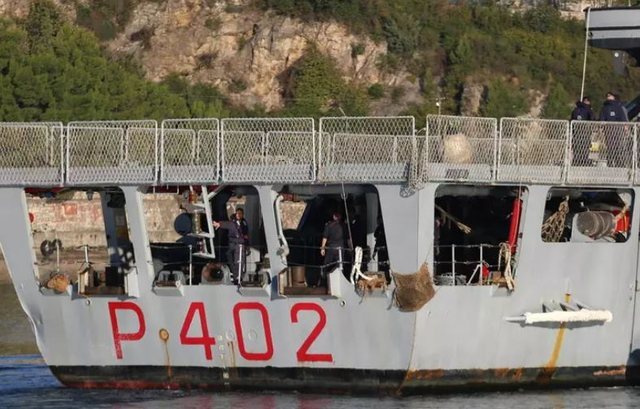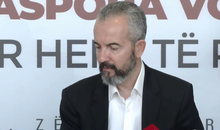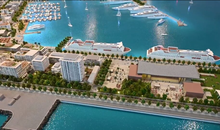
Ship with 100 migrants from Italy arrives in Shëngjin on Wednesday

The next ship carrying around 100 migrants deported from Italy is expected to arrive at the Port of Shëngjin on Wednesday, who will be placed in the Gjadri camp. This is the third time that such migrants have been transferred to Albania, under the agreement signed between Italian Prime Minister Giorgia Meloni and Albanian Prime Minister Edi Rama in 2023.
Unlike the beginning of the project, where the centers in Shëngjin and Gjadra were intended to house migrants awaiting asylum, the Italian government has changed their purpose. According to a recent statement by the Italian Interior Minister, Matteo Piantedosi, the migrants to be sent to Albania will be deportees, who do not have the right to reside in Italy.
In an interview given on March 25, 2025, Piantedosi announced that the new objective is to transform these structures into Repatriation Detention Centers (CPR), with a stay of up to 18 months. According to him, this policy will strengthen the process of returning irregular migrants to their countries of origin.
Despite efforts to implement the agreement, the project has not been without legal obstacles. In October and November of last year, Italian courts blocked the transfer of asylum seekers to Albania due to uncertainty regarding countries of origin and the lack of a unified list of safe countries within the EU. However, on December 30, 2024, the Court of Cassation in Italy ruled in favor of the Meloni government, confirming that the assessment of safe or unsafe countries remains the exclusive competence of the Ministry of Foreign Affairs and the government cabinet.
Meanwhile, the agreement continues to be the subject of public debate. The Italian opposition has called the project costly and impractical, stressing that 800 million euros over 5 years is an unjustifiable cost for a limited number of people, while international human rights organizations have criticized it as an attempt to shift the burden of the migrant crisis to countries with weaker legal and economic systems.
However, the European Commission and some EU leaders have expressed interest in this model, considering it an opportunity for managing immigration outside the borders of the European Union.
Latest news


The hearing at the GJKKO for the "5D" file is postponed again
2025-04-17 10:33:43
Zeno's Arrow and Albania in the EU
2025-04-17 10:21:47
Teacher arrested for sexually harassing underage students in Librazhd
2025-04-17 10:07:07

Accusations of collaboration with Rama, Soros rejects comments to "Fox News"
2025-04-17 09:45:32
Foreign exchange/ How much foreign currencies are bought and sold today
2025-04-17 09:42:44
Electoral State/SP accused of misusing institutions for election campaign
2025-04-17 09:30:32

Last year, 20 operators were excluded from the right to win tenders.
2025-04-17 09:09:34
Two vehicles collide at the Tapiza Bridge, one woman dies
2025-04-17 09:01:26
7 tourists rescued after being trapped in Nivica Canyon
2025-04-17 08:41:31
Report: Albania, the only country in the region without industrial policies
2025-04-17 08:32:04
Horoscope, what do the stars have in store for you?
2025-04-17 08:17:21
Temperatures continue to remain high, weather forecast for this Thursday
2025-04-17 08:02:35
Morning Post/ In 2 lines: What mattered yesterday in Albania
2025-04-17 07:49:39

Rama will avoid taking stock at all costs, Berisha has a substantive campaign
2025-04-16 22:35:34


A cartridge at the scene and one injured, details of the shooting in Tirana
2025-04-16 21:34:33
Prices from Lushnja to Tirana, the trader earns more than the producer
2025-04-16 21:31:15


Berisha: Beketi refused to become Rama's slave, you pay 110 million euros now
2025-04-16 20:51:58
Gunfire at the Lake Dam in Tirana
2025-04-16 20:37:22

Accident in Kukës-Krumë, three injured after two cars collide
2025-04-16 20:25:23
Turkey hosts Black Sea security talks
2025-04-16 20:08:45



Mercury enters Aries on April 16: How it affects each zodiac sign
2025-04-16 19:13:37




BIRN: Tirana's "ghost" incinerator affair deflates in court like a soap bubble
2025-04-16 18:24:13


“450 new schools?” - When the electoral calculations don't add up
2025-04-16 17:17:44

Poll/ Which party do you plan to vote for on May 11?
2025-04-16 16:53:24
Doctors sound the alarm: Heart disease is increasingly affecting young people
2025-04-16 16:50:04
Serious in Germany/ Doctor accused of murdering 15 patients
2025-04-16 16:30:27
Knife fight in Kurbin!, three people injure a 30-year-old man
2025-04-16 16:25:36
Car hits Foreign Ministry official on white lines
2025-04-16 16:10:01


Organized gambling in a bar via mobile phone, 29-year-old arrested in Tirana
2025-04-16 15:36:30
Rama continues attacks on LaCivita
2025-04-16 15:26:41
How Vis Martinaj's 'soldier' and two others tried to eliminate Durim Bami
2025-04-16 15:14:18

Berisha: McGonigal's shadow will follow Edi Rama until the last day of his life
2025-04-16 14:59:55
Eurostat: Inflation in March 2.5% due to higher food prices
2025-04-16 14:50:34
LaCivita: Developments in Albania are being closely followed by the US as well
2025-04-16 14:39:07




Second file, GJKKO passes on to trial Jorgo Goron
2025-04-16 13:49:04




Kosovo is included in the list of countries
2025-04-16 13:12:24
Can a change in mentality save the world?
2025-04-16 13:01:48
Requested revocation of security measure, hearing at GJKKO for Veliaj postponed
2025-04-16 12:52:19

Car hits Foreign Ministry employee, he is taken to Trauma in serious condition
2025-04-16 12:31:31


Berisha meets with tourism associations: This sector is swimming in informality!
2025-04-16 11:59:11


Topalli publishes diaspora message: 3 votes from Germany against the regime
2025-04-16 11:22:13
The director of the Elbasan Waterworks, Luan Tabaku, appears before SPAK
2025-04-16 11:11:21
William Levy arrested, here's what he's accused of
2025-04-16 11:04:15

Paloka: Rama is using the state to manipulate the elections
2025-04-16 10:45:09
The electoral machinery: SP directors versus former directors or ordinary people
2025-04-16 10:32:26
Veliaj seeks freedom, hearing at the Special Court takes place today
2025-04-16 10:21:06
How much was LaCivita paid? Mediu: Expenditures are transparent at the CEC
2025-04-16 10:10:19
BKH agents raped, Agron Kapllanaj's two nephews handcuffed (NAMES)
2025-04-16 10:02:49
Gunshot wound in Lushnje
2025-04-16 09:45:14
People who have low emotional intelligence often use four expressions
2025-04-16 09:35:58
The wife of Veliaj's friend appears at SPAK
2025-04-16 09:23:28


Foreign exchange, April 16, 2025
2025-04-16 08:52:11


Horoscope, what do the stars have in store for you?
2025-04-16 08:19:42
Temperatures are rising again, here's the weather forecast for today
2025-04-16 08:06:31
Morning Post/ In 2 lines: What mattered yesterday in Albania
2025-04-16 07:53:11




